Christmas / New Year 2025
Sunday, December 21, 2025
 We normally spend Christmas in Germany, but this year, we shall be staying at home in Spain. I was "home alone" last Christmas - "de Rodriguez" - in order to look after our newly acquired baby kitten, Paulinchen, but it's more usual for us to be in the frozen and snowy north. We normally spend Christmas in Germany, but this year, we shall be staying at home in Spain. I was "home alone" last Christmas - "de Rodriguez" - in order to look after our newly acquired baby kitten, Paulinchen, but it's more usual for us to be in the frozen and snowy north.
[deutschland.de]
So, how's it looking?
 We had our first Christmas Party of 2025 on December 10th at Restaurante Manovra in Cala de Mijas on the Costa del Sol. It was the annual get-together of the Club de Prensa de la Costa del Sol (Costa Press Club) of which I am a member. We had our first Christmas Party of 2025 on December 10th at Restaurante Manovra in Cala de Mijas on the Costa del Sol. It was the annual get-together of the Club de Prensa de la Costa del Sol (Costa Press Club) of which I am a member.
We enjoyed a "Secret Santa" and a "Christmas Quiz", as well as great "bantz" (banter) and delicious food.
[photo courtesy of www.help-me-ronda.com]
 On Christmas Day (Dia de Navidad) we have booked for lunch at "Frank's", better known as El Muelle de Arriate. On Christmas Day (Dia de Navidad) we have booked for lunch at "Frank's", better known as El Muelle de Arriate.
Consistently in Trip Advisor's top three restaurants in the area, this has been one of our favourite places to eat over the years (18 and counting .....).
[Photo: Karl Smallman, Secret Serrania]
A three-course meal with wine included at 68 euros per person is not cheap, but we know it will be good value. Dutchman Frank Röttgering knows what he's doing. He has mastered the "trick" of appealing to a foreign clientele, as well as to well-heeled Spaniards (Frank is somewhat of a polyglot, speaking English, French, German, Spanish and, of course, his native Dutch).
 On December 27th we have been invited to what we British would call a "house-warming party" (Sp: fiesta de inauguracion de la casa; Ger: Einweihungsparty) in Montejaque, where we both have good connections (we lived there together for three years and own two village houses in the Old Part of the village). On December 27th we have been invited to what we British would call a "house-warming party" (Sp: fiesta de inauguracion de la casa; Ger: Einweihungsparty) in Montejaque, where we both have good connections (we lived there together for three years and own two village houses in the Old Part of the village).
The hosts of the party are Kryszta from Hungary and Karl, a German, who recently bought a house two doors down from Rita's.
[Image by THE FIRE WIRE]
The pair have already visited us at our home in Ronda for Kaffee mit Kuchen and I've been helping them with translation and administrative and other matters.
 On New Year's Eve (Noche Vieja) we have booked for a menu de degustacion (tasting menu) at Restaurante La Cascada at the Hotel Molino del Puente, Ronda. On New Year's Eve (Noche Vieja) we have booked for a menu de degustacion (tasting menu) at Restaurante La Cascada at the Hotel Molino del Puente, Ronda.
At 100 euros per head that's expensive, but, hey! It's fiesta time!
We are regular diners here and know the quality of their food.
Ian and Elaine, the owners, take care of "front of house" and son-in-law Tom is the chef. It all runs like clock-work.
The advantage for us, is that we live 50 metres away, so no parking charges and no risk of being breathalysed!
[Turismo de Ronda]
Other activities
 We may also eat at Las Maravillas, Miyagi Express, or Sensur (all Ronda), places we know and love. We may also eat at Las Maravillas, Miyagi Express, or Sensur (all Ronda), places we know and love.
We also want to try out Ronda's only Indian Restaurant, the recently opened Bombay Spice.
[Facebook]
If it re-opens in time, the under-new-management Ronda Valley Hotel, would also be on our list.
 There are also theatre options, concerts, art exhibitions, Christmas markets and, weather permitting, street parades. There are also theatre options, concerts, art exhibitions, Christmas markets and, weather permitting, street parades.
Plus pantomime, zambomba, films and much, much more.
[Portal Tematico de la Serrania de Ronda]
Interesting links
Bars and Restaurants at or near railway stations in the Serrania de Ronda - Help me, Ronda
Christmas in Spain
Christmas Parties in Spain 2024
Christmas Tour of Deutschland Part 1 - From Malaga to Hamburg, Uetersen and Dresden
Christmas Tour of Deutschland Part 2 – Dresden I
"DINNER FOR ONE" - Ein Silvesterphänomen
Foreign Journalists Celebrate their Christmas Party
Something old, something new ...
© Pablo de Ronda
Pictures:
deutschland.de, Facebook, Karl Smallman, Portal Tematico de la Serrania de Ronda, Secret Serrania, THE FIRE WIRE, Turismo de Ronda
Restaurants:
Bombay Spice, Ronda (5) Bombay Spice | Facebook
El Muelle de Arriate, Arriate El Muelle de Arriate – Restaurant
La Cascada, Fuente de La Higuera, Ronda Menú del restaurante: Restaurante La Cascada en Hotel de Ronda HMDP
Las Maravillas, Ronda Restaurante Las Maravillas, en Ronda
Miyagi Express, Ronda El mejor sushi de Ronda, al mejor precio
Restaurante Manovra, Cala de Mijas (5) Facebook
Ronda Valley Hotel, Fuente de La Higuera, Ronda HOTEL RONDA VALLEY: opiniones, comparación de precios 2025
Sensur, Ronda Una experiencia gastronómica en el corazón de Ronda - SENSUR GASTROBAR
Thanks:
Karl Smallman, Paul Whitelock, Secret Serrania, Wikipedia, www.help-me-ronda.com
Tags:
AfD, art exhibitions, Bombay Spice, Cala de Mijas, Christmas Day, Christmas markets, "Christmas Quiz", Club de Prensa de la Costa del Sol, concerts, Costa Press Club, "de Rodriguez", Dia de Navidad, "Dinner for One", Dresden, Einweihungsparty, El Muelle de Arriate, fiesta de inauguracion de la casa, films, Frank Röttgering, Frank's, "home alone", Hotel Molino del Puente, "house-warming party", Hungary, Indian Restaurant, Kaffee mit Kuchen, Karl, Karl Smallman, Kryszta, La Cascada, Las Maravillas, menu de degustacion, Miyagi Express, Montejaque, New Year's Eve, Noche Vieja, pantomime, Paulinchen, Ronda, Portal Tematico de la Serrania de Ronda, "Secret Santa", Secret Serrania, Sensur, street parades, tasting menu, theatre, THE FIRE WIRE, Turismo de Ronda, Wikipedia, zambomba,
 0
Like
Published at 1:42 PM Comments (0)
0
Like
Published at 1:42 PM Comments (0)
EuroWeekly News shock!
Friday, December 12, 2025
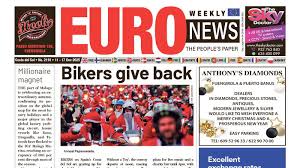 I was on the coast in Cala de Mijas and picked up a copy of the EWN, the free paper that never gets up to Ronda, where I live. I was on the coast in Cala de Mijas and picked up a copy of the EWN, the free paper that never gets up to Ronda, where I live.
No great loss, as it was always a terrible paper, with few journalistic aspirations or intentions.
[EWN]
The owners, the Eusdens, are business people, not Press folk, and the vitriolic, racist, sexist and foul-mouthed Leapy Lea, failed English pop singer, acquired a 'gig' as a regular columnist.
But .....
I was pleasantly surprised with this latest edition, published today!
 Gone are the poorly written, badly researched, sensationalist news stories of old. Gone are the poorly written, badly researched, sensationalist news stories of old.
And Leapy Lea was reasonable and measured! I nearly fell off my chair!
Do you think he's had 'his collar felt' by 'The Old Bill'?
I'd heard on the grapevine that if Lea were to return to the UK he would be arrested for expressing in writing his extreme right wing views.
Leapy Lea nowadays [Amazon]
Good to see these changes for the better ..... but, will they last?!
© Paul Whitelock
Photos:
Amazon, EWN, Euro Weekly News,
Thanks:
Costa Press Club, Euro Weekly News, Wikipedia
Tags:
Cala de Mijas, columnist, Eusden, EWN, failed English pop singer, free paper, Leapy Lea, Ronda, 'The Old Bill',
 0
Like
Published at 11:15 PM Comments (2)
0
Like
Published at 11:15 PM Comments (2)
Foreign Journalists Celebrate their Christmas Party
Thursday, December 11, 2025
The Club de Prensa de la Costa del Sol (Costa Press Club) celebrated its Christmas Party last night, 10th December.
 This group of foreign journalists and media people, who are based in the wider Malaga, Marbella, Mijas and San Pedro de Alcantara area, got together at Restaurante Manovra in Cala de Mijas, number 2 out of 123 restaurants in the area according to Trip Advisor, to relax and celebrate Christmas. This group of foreign journalists and media people, who are based in the wider Malaga, Marbella, Mijas and San Pedro de Alcantara area, got together at Restaurante Manovra in Cala de Mijas, number 2 out of 123 restaurants in the area according to Trip Advisor, to relax and celebrate Christmas.
Restaurante Manovra [Ayuntamiento de Mijas]
'Secret Santa' popped in, and there was a 'Christmas Quiz'.
How'd it go?
The mood was festive, relaxed and fun. There was nothing serious that had anything to do with media and journalism.
After a pre-dinner drink (included in the price), during which members and their guests caught up with old acquaintances and friends, and new people, mainly guests of members, were introduced, we sat down for our three-course Christmas Meal.
 I went traditional with soup, Christmas roast and Christmas pudding, while my guest, my wife, opted to avoid the roast and went for fish - Rita is German and not a fan of English roasts. I went traditional with soup, Christmas roast and Christmas pudding, while my guest, my wife, opted to avoid the roast and went for fish - Rita is German and not a fan of English roasts.
We were sitting opposite Sara, from Australia, and her guest Emma, who bore an uncanny resemblance to a former girlfriend of mine. Emma is English, but has lived in Spain for 28 years!
[Trip Advisor]
Sara is a member of the CPC and is a journalist. She lives in Alhaurin El Grande.
Emma was for many years an estate agent on the coast and is now considering her options away from the cut-throat world of real estate.
Also nearby were Andrew, English, and a long-time amigo mio, and Joanne, also English, who has lived in southern Spain for donkey's years and is married to a Spaniard. She organised the evening.
 Two Spanish "guests" were also within earshot. It turns out that they are the children of another long-standing CPC member, Joan Fallon, a celebrated author originally from Scotland. So Roberto and Maria are, of course, bi-lingual. Two Spanish "guests" were also within earshot. It turns out that they are the children of another long-standing CPC member, Joan Fallon, a celebrated author originally from Scotland. So Roberto and Maria are, of course, bi-lingual.
At the other end of the table was another newcomer/guest called Lily. She was born in Spain of English parents who had emigrated to Spain in search of a better life. She attended secondary school in England and went to university there. She is also bi-lingual.
Joan Fallon [Facebook]
My wife observed that of the 33 people dining, only five were men, four active members and a guest.
Nationalities represented last night were, in alphabetical order, Australian, English, German, Scottish, Spanish and Welsh, although the membership also includes people from Argentina, Denmark, France, the Netherlands and New Zealand, who all live in Spain full-time.
 Everyone speaks Spanish to a greater or lesser extent. Everyone speaks Spanish to a greater or lesser extent.
Five of us have degrees in Spanish: committee member Jennie Rhodes (Durham); retired president and former editor of SUR in English Liz Parry BEM (Birmingham); current president Neil Hesketh (Manchester); editor of SUR in English Rachel Haynes (Newcastle) and I, retired member and blogger Paul Whitelock (Salford). In addition, current trainee Enya Soares is an undergraduate at Bath.
Liz Parry BEM [Central Bylines]
 Lots of photos were taken, officially by Gary Edwards, a professional photographer member, and by others present, including myself. Lots of photos were taken, officially by Gary Edwards, a professional photographer member, and by others present, including myself.
More photos of the actual evening, from Gary, me and others, are still to come.
We shall add them in the next few days.
Gary Edwards [Costa Press Club]
Photos:
Ayuntamiento de Mijas, Central Bylines, Costa Press Club, Facebook, Gary Edwards, Paul Whitelock
© Paul Whitelock
Links:
Magnificent, under-rated Málaga
Mini-break in Malaga
Thanks:
Costa Press Club, Facebook, Gary Edwards, LinkedIn, Paul Whitelock
Tags:
Ayuntamiento de Mijas, Central Bylines, Costa Press Club, Enya Soares, Facebook, Gary Edwards, Jennie Rhodes, LinkedIn, Liz Parry BEM, Neil Hesketh, Paul Whitelock, Rachel Haynes, SUR in English
 0
Like
Published at 7:38 PM Comments (0)
0
Like
Published at 7:38 PM Comments (0)
Spain is dangerous this winter!
Monday, December 1, 2025
 There are a number of health warnings in Spain for the coming winter: influenza, Avian flu, African swine fever, Tetanus, and of course, Coronavirus is still a threat. There are a number of health warnings in Spain for the coming winter: influenza, Avian flu, African swine fever, Tetanus, and of course, Coronavirus is still a threat.
There are 3,000 new cases of AIDS diagnosed each year in Spain.
Plus freezing temperatures.
[CPWR]
This is all dangerous, particularly for older people. Which is what I am, according to my birth certificate, even though I feel much younger.
Action Plan
 The fifth Covid-19 injection is now available for over 70-year-olds. The fifth Covid-19 injection is now available for over 70-year-olds.
They don't contact you any longer, you have to ring your local health centre or ambulatorio to make an appointment.
I shall be doing that tomorrow.
[EL PAIS]
You also get a 'flu jab and a tetanus top-up at the same time. So three pricks in two arms!
Your upper arms are sore for two or three days and you might have a slight attack of Covid, but, in my opinion, it's better to be protected.
I don't have AIDS nor African swine fever. Touch wood!
Elsewhere
 Some members of the German side of my family are refuseniks when it comes to Coronavirus injections and only get top-up Covid jabs if they really have to, for example to get into a restaurant or to book into a hotel. Some members of the German side of my family are refuseniks when it comes to Coronavirus injections and only get top-up Covid jabs if they really have to, for example to get into a restaurant or to book into a hotel.
I think they're nuts, but that's their choice, I guess.
So long as they don't infect me or the missus!
[BBC]
Here in Spain
The authorities are predicting more deaths this winter, because of the predicted cold. Two regions have re-introduced the compulsory wearing of masks, and others, like Andalucia, are recommending their use in medical settings, including pharmacies.
Most houses here are not well built. Cavity walls? "Forget it!" Insulation? "Ha-ha-ha!"
 A professional friend of mine, a neighbour, has no heating whatsoever in her finca. She just wraps up warm! A professional friend of mine, a neighbour, has no heating whatsoever in her finca. She just wraps up warm!
She does at least have a traditional brasera under her dining table!
I've offered to act as a human hot water bottle for her, but up to now she's not accepted!
What a shame! She's pretty, very "sexy", single, a good 10 years younger than me and Spanish to boot!
[Wikipedia]
Last word
These winter threats need to be taken seriously. I mean it!
© Pablo de Ronda
Links:
5 years of Covid-19 - The last post
Covid-19 is a thing of the past – or is it?
Is the Covid Crisis Over?
Pictures:
BBC, CPWR, EL PAIS, Wikipedia
Acknowledgements:
Diario Sur, Pablo de Ronda, Sur in English, TIME, Wikipedia
Tags:
AIDS, African swine fever, Avian flu, BBC, CPWR, Coronavirus injection, Diario Sur, EL PAIS, freezing temperatures, health centre, health warning, human hot water bottle, influenza, masks, medical settings, Pablo de Ronda, pharmacies, Sur in English, Tetanus, TIME, top-up Covid jab, Wikipedia
 0
Like
Published at 9:10 AM Comments (0)
0
Like
Published at 9:10 AM Comments (0)
Ronda Valley Hotel to close? F**k!
Friday, November 28, 2025
The worst kept secret around these parts is that the Ronda Valley Hotel (formerly Hotel Don Benito) is to close its doors on 15th January 2026. WTF! Why?
 This hotel is my nearest local, so from a selfish point of view, I think it's a disaster. This hotel is my nearest local, so from a selfish point of view, I think it's a disaster.
Talking with other "guiris" who live nearby, it's a catastrophe for them also.
Ronda Valley Hotel [Photo: A1 Inmobiliaria]
The local folk, almost all andaluces, mostly involved with agriculture - olives, grapes, hortalizas of all kinds - or livestock farmers - sheep, goats, pigs and cattle - this is where they come to chill out after work and quench their raging thirsts.
Backstory
I've lived around here for 17 years and I've experienced a number of different "owners" and at least three name changes to the hotel in question.
For many years it was Hotel Don Benito, then La Posada de Ronda and latterly Ronda Valley Hotel.
 The owner was Pedro, but he died a couple of years ago. His only heir is a daughter who has no interest in running a hotel, just like her dad. Pedro always leased the hotel to others to run. The owner was Pedro, but he died a couple of years ago. His only heir is a daughter who has no interest in running a hotel, just like her dad. Pedro always leased the hotel to others to run.
I can remember Manolo from Ronda; a German couple from, well, Germany; Luis from Arriate; and Sergio and Manuel from Lisbon, Portugal.
Mural in the refurbished bar [Andalucia.org]
The most successful have been the Portuguese, even though they never come, leaving the hotel in the hands of a manager.
So, what's going on?
You hear lots of stories but are they true?
Final Musings
So, we have another two months before the place closes.
 I really don't get it. This hotel has so much potential. I really don't get it. This hotel has so much potential.
Easy to get to, also for passing motorists; massive free car park; bar; restaurant; function room; large outside terrace; 20 rooms; extensive grounds with tennis court, padel court and swimming pool; barbecue area.
The large terrace [Atrapalo]
If I were three decades younger; had a background in hospitality; and had the money, I would be first in the queue to buy it.
Talking it over with two local estate agents, one estimated that the purchase price would be around 1.2 million euros; the other 1.8 million. Quite a difference! The latter estimate was because of the potential of the hotel and grounds.
 My big idea is that they need to hold live music events on the terrace or in the function room. A guaranteed money-spinner if done properly. There is already a strong tradition of live music in the Serrania de Ronda, eg at the Irish Bar in Ronda; Allioli Bar y Mas in Jimera de Libar; and Bar Restaurante EntreAscuas in Montejaque. My big idea is that they need to hold live music events on the terrace or in the function room. A guaranteed money-spinner if done properly. There is already a strong tradition of live music in the Serrania de Ronda, eg at the Irish Bar in Ronda; Allioli Bar y Mas in Jimera de Libar; and Bar Restaurante EntreAscuas in Montejaque.
[Allioli bar y mas]
Another good idea would be tapas at the bar.
Changing the horario of the restaurant would be a smart move: 7.00 - 10.30 would be welcomed by the very many hotel guests from Northern Europe, USA and Canada.
And also by some of the locals.
[Sign by Mar y Ram]
The bedrooms need a makeover. They are a bit dated, basic and shabby. Once the renovation is completed the hotel could "up" its prices. 30 € a night for a double room off-season is way too cheap.
Let's hope somebody comes along and buys the hotel and fulfils its potential.
Otherwise, we locals will have to either give up drinking or travel further afield.
Arrgh!
STOP PRESS:
This evening, Tuesday December 2nd, the hotel was shut and displaying a "closed for holidays" sign.
The Ronda Valley is always open - it's a proper hotel, which always has guests who need to eat and have a drink.
The bar is a public one, open to the many locals who enjoy a few drinks before going home for dinner and also to passing trade.
[Adobe Stock]
So, why has it shut? It seems a bit fishy to me.
© Pablo de Ronda
Links:
Another - new – Ronda Valley
The other "Ronda valley"
Pictures:
A1 Inmobiliaria, Adobe Stock, Allioli Bar y Mas, Andalucia.org, Atrapalo, Mar y Ram
Thanks:
A1 Inmobiliaria, Eye on Spain, LoveViviendas, Pablo de Ronda, Paul Whitelock, Sierra Estates
Tags:
A1 Inmobiliaria, Adobe Stock, Allioli Bar y Mas, Andalucia.org, Atrapalo, Bar Restaurante EntreAscuas, Eye on Spain, Hotel Don Benito, Irish Bar in Ronda, Jimera de Libar, La Posada de Ronda, LoveViviendas, Luis from Arriate, Manolo from Ronda, Mar y Ram, Montejaque, Pablo de Ronda, Paul Whitelock, Portugal, Ronda Valley Hotel, Sergio and Manuel from Lisbon, Serrania de Ronda, Sierra Estates
 0
Like
Published at 6:55 PM Comments (0)
0
Like
Published at 6:55 PM Comments (0)
All about Spanish surnames
Friday, November 28, 2025
 Spanish surnames (apellidos - they have two, one from their father and another from their mother) can be classified into four main types. Spanish surnames (apellidos - they have two, one from their father and another from their mother) can be classified into four main types.
Knowing about the past allows us to learn a bit more about ourselves, where our culture comes from, what our history is, what our families were like.
[Image courtesy of Wikipedia]
All this has been concentrated into our surnames, a thread which tells us about our past.
 In an article for AS, the Spanish sports daily, journalist Marta Tejedor talks readers through the four categories. In an article for AS, the Spanish sports daily, journalist Marta Tejedor talks readers through the four categories.
***
[AS]
I've edited Marta's article and translated it into English.
The original edited article in Spanish is here:
Spanish surnames - apellidos
***
Spanish surnames are divided into four types: find out which type your surname belongs to
By Marta Tejedor
2 minutes read
 According to the newspaper OK Diario, experts have created four main types of Spanish surnames into which they can be classified. According to the newspaper OK Diario, experts have created four main types of Spanish surnames into which they can be classified.
Depending on the category they belong to, the surname in question can provide certain information about its origin.
[ElPlural.com]
Among these categories are patronymic surnames, toponymic surnames, surnames derived from common names, and surnames derived from trades or professions.
Which type of surname does yours belong to?
Patronyms
 This type of surname indicates the name of the father or ancestor from whom it originates. This type of surname indicates the name of the father or ancestor from whom it originates.
They are very common in Spain and in some Spanish-speaking countries.
Among them, some stand out, such as Pérez, which means “son of Pedro”; Sánchez, “son of Sancho”; or Fernández, “son of Fernando.”
[Facebook]
This type of surname usually ends in -ez, -az, -iz, -oz, -uz.
Toponyms
 This category includes all surnames whose meaning indicates the place of origin or residence of the bearer or their ancestors, according to YouTube. This category includes all surnames whose meaning indicates the place of origin or residence of the bearer or their ancestors, according to YouTube.
Interestingly, some examples of these surnames are Torres, Castellano, or Castillo, all of them originating from Castilla. Other examples are Navarro and Navarrete, both originating from Navarra.
[Slideshare]
Derived from common names
 Very similar to patronyms, this category of surnames is based on some physical, moral, or religious trait of the bearer or their ancestors. Very similar to patronyms, this category of surnames is based on some physical, moral, or religious trait of the bearer or their ancestors.
The surname Rubio is a clear example of how a physical trait of an ancestor has been passed down to their descendants. Other examples, like Bravo, originated from a brave act or from people considered courageous. Cruz, for example, can mean 'executed' or 'devoted to the cross.'
[Euribor hoy]
Derived from trades or professions
 In this category are all surnames whose meaning relates to the occupational or social activity of the bearer or their ancestors. In this category are all surnames whose meaning relates to the occupational or social activity of the bearer or their ancestors.
Some examples are Tejedor, Pastor, Herrera, or Molina, the latter coming from the work of a miller.
[Letra 15]
But there are not just these four types: there are also surnames that come from nicknames based on the bearer’s nickname, such as in the cases of Largo or Gordo.
 
Largo [Cartoon courtesy of Dreamstime] Gordo [Cartoon courtesy of Freepik]
***
Note: A similar article was published in Spanish here:
Spanish surnames - apellidos
© Paul Whitelock
Images:
AS, Dreamstime, ElPlural.com, Euribo hoy, Facebook, Freepik, Letra 15, Slideshare, Wikipedia, YouTube,
Acknowledgements:
Don Pablo, Paul Whitelock, Wikipedia
Tags:
apellido, Castellano, Castilla, Castillo, “cruzado”, Bravo, Cruz, Delgado, “devoto de la cruz”, English, Fernández, Gordo, Herrera, “hijo de Fernando”, “hijo de Pedro”, “hijo de Sancho”, Largo, Marta Tejedor, Molina, molinero, Navarra, Navarrete, Navarro, OK Diario, Pastor, Pérez, Rubio, Sánchez, Spanish, "Spanish Matters", surname, Tejedor, Torres,
 0
Like
Published at 9:19 AM Comments (0)
0
Like
Published at 9:19 AM Comments (0)
Alien customs - a British immigrant's view of Spain
Thursday, November 20, 2025
 This article is not specifically about me. This article is not specifically about me.
It's about foreigners, or "guiris", who move permanently to live in Spain, and often experience a kind of "culture shock".
[Video courtesy of YouTube]
Anna, a young Briton who moved recently to live in Madrid, explained her situation to the newspaper AS this week.
I too was a young Briton when I first came to Spain 50-odd years ago. I knew almost immediately that Spain would be my destiny, and, although it took me nearly 40 years to make the permanent move, I have now clocked up some 17 years as a resident.
 AS AS
Una británica que vive en Madrid revela las costumbres españolas que niega aceptar:
“Tengo que luchar bastante”
Historia de Marta Tejedor
Moving to a new country often requires getting to know new cultures, learning unfamiliar languages, and even accepting certain customs you didn't even know existed beforehand.
Spain is a country that welcomes millions of tourists every year, and some of them decide to stay longer to enjoy the country's climate and cuisine, amongst other things.
Anna, a TikToker who uploads content to her account on the social media platform, annainespana, talked about three things she can't stand about Spain.
Three Things She Can't Accept
The Heat
 High temperatures in summer are a daily occurrence in Spain, especially in Madrid, a city with more asphalt than green spaces. High temperatures in summer are a daily occurrence in Spain, especially in Madrid, a city with more asphalt than green spaces.
In June, July, and August, temperatures can reach up to 40 degrees Celsius (104 degrees Fahrenheit).
Anna confesses that the sun in Madrid is a lot hotter than in England, and that it's hard to get used to.
[Image courtesy of Dreamstime]
The Bureaucracy
 Coming to Spain as a tourist is relatively easy; the problem arises when an immigrant decides he wants to live in the country. Coming to Spain as a tourist is relatively easy; the problem arises when an immigrant decides he wants to live in the country.
At that point, a period of paperwork and obtaining permits begins that often seems never-ending.
[Image unattributed]
Anna explains that she had many problems obtaining her visa, not because she didn't meet the requirements, but because the process in Spain is slow and requires permits that often seem almost impossible to obtain.
Spanish Nightlife
 In England, people eat dinner and go to bed much earlier than Spaniards. The Spanish timetable is much more nocturnal than in Britain. Going out at nine or ten at night and returning home at three in the morning is something Anna is used to from the UK, yet that seems quite strange in Spain. In England, people eat dinner and go to bed much earlier than Spaniards. The Spanish timetable is much more nocturnal than in Britain. Going out at nine or ten at night and returning home at three in the morning is something Anna is used to from the UK, yet that seems quite strange in Spain.
In Spain, Anna has observed that people usually go out to clubs around midnight or one in the morning and return home around seven or eight at night the following day!
[Photo courtesy of Enjoy Travel]
“I prefer to sleep,” the TikToker confesses.
Paul aged 20
 I was shipped off to Spain in 1970 for my year abroad (I was studying for a degree in Spanish and German). I was shipped off to Spain in 1970 for my year abroad (I was studying for a degree in Spanish and German).
Our group was sent to San Sebastián to do a course for three months, followed by "doing our own thing" for a further three. In Spain of course.
I loved it and there began my dream to live in Spain one day.
View of San Sebastian [The Independent]
Paul aged 58
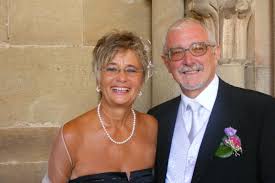 After marriage, two children, a 30-year career in education, redundancy and divorce, I finally made the move when, in 2008, I met a German lady who was already living in Spain who became my second wife in 2010. After marriage, two children, a 30-year career in education, redundancy and divorce, I finally made the move when, in 2008, I met a German lady who was already living in Spain who became my second wife in 2010.
I've been here ever since.
Our wedding in Maulbronn, Germany [HMR]
Paul aged 75
This year I reached the grand old age of 75. I'm in my 17th year as a resident and intend to stay put.
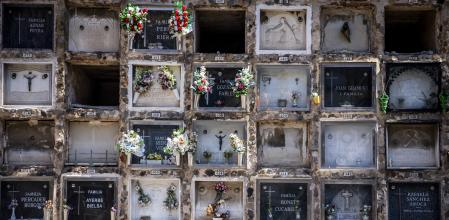 I shall die here. I've already reserved my nicho at the cemetery. I shall die here. I've already reserved my nicho at the cemetery.
I've also tidied up my affairs and written a new Will, which is valid in Spain, yet takes into account my current status as a British citizen.
[Photo of nichos by La Vanguardia]
The issues that still bother me are bureaucracy, litter, noise and the police (especially Guardia Civil Trafico).
But I shall continue to be patient, go through their processes and speak to officials cara a cara.
Conclusion
Back to the inspiration for this article, Anna, in Madrid. "Don't give up, love. Persevere and adapt. I hope you have a lifetime of happiness here in Spain."
Like I have had!
Links:
MY SPECIAL PLACES IN SPAIN - Help me, Ronda
What I hate about Spain! - Secret Serrania de Ronda
Why I love living in Spain's Serranía de Ronda - Secret Serrania de Ronda
© Pablo de Ronda
Pictures:
AS, Dreamstime, Enjoy Travel, HMR, La Vanguardia, The Independent, YouTube
Thanks:
AS, Marta Tejedor, MSN, Paul Whitelock, Wikipedia
Tags:
annainespana, AS, bureaucracy, culture shock, Dreamstime, Enjoy Travel, foreigner, Guardia Civil Trafico, guiri, HMR, immigrant, La Vanguardia, litter, Madrid, Marta Tejedor, Maulbronn, MSN, nicho, noise, Paul Whitelock, San Sebastian, Secret Serrania, The Independent, TikTok, Wikipedia, www.eyeonspain.com, www.help-me-ronda.com, www.secretserrania.com
 5
Like
Published at 11:41 PM Comments (0)
5
Like
Published at 11:41 PM Comments (0)
Disasters and Emergencies - Costa Press Club
Thursday, November 6, 2025
The November meeting of the Costa Press Club (El Club de prensa de la Costa del Sol) took place this last Tuesday, November 4th.
 The venue was the delightful La Sierra restaurant at the Cerro de Aguila golf club high in the hills above Fuengirola. The topic was "Journalists as lifesavers: communication and crisis management in emergencies." The venue was the delightful La Sierra restaurant at the Cerro de Aguila golf club high in the hills above Fuengirola. The topic was "Journalists as lifesavers: communication and crisis management in emergencies."
CPC President Neil Hesketh introduces speaker Fernando Fernandez [Photo: PW]
The presentation
Our guest speaker was Fernando Fernández Alcaide, who is professor of security, emergencies and catastrophes at the Universidad de Málaga.
 Fernando is also the spokesperson for VOST (Digital Volunteers in Emergencies) in Andalucia and is a member of the National Emergency Communication Committee of the National Association of Professional Specialists in Emergencies and Civil Proteccion (ANEPPCE). Fernando is also the spokesperson for VOST (Digital Volunteers in Emergencies) in Andalucia and is a member of the National Emergency Communication Committee of the National Association of Professional Specialists in Emergencies and Civil Proteccion (ANEPPCE).
[Photo: Paul Whitelock]
With the help of hundreds of slides and short videos Fernando really opened our eyes to how lacking the authorities are when it comes to dealing with disasters.
Some of the disasters he focused on included:
Chernobyl in 1986, Valencia in 2024, the train crash in Galicia in 2013, ébola, the danas of 2024, el apagón of earlier this year.
  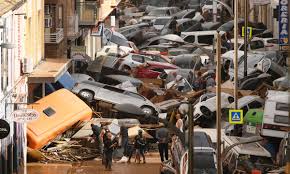
Chernobyl 1986 [EL PAIS] Santiago derailment 2013 [The Guardian] Aftermath of flooding, Valencia 2024 [The Guardian]
He was very critical of the standard reaction of the authorities to disasters.
It was a very challenging and thought-provoking presentation. Fernando is of the view that the Press and Media have a key role to play in getting the right information out there as quickly as possible and in contributing to crisis management.
All areas need a rapid response protocol for emergencies such as earthquakes, tsunamis, hurricanes and forest fires, although he pointed out, to much laughter, that a tsunami plan for mountain areas would be a waste of time!
Several members contributed to the Q & A session, including one member who highlighted the rapid reaction of firefighters in attending an incident near Ronda the day before, because THEY HAD AN EMERGENCY PLAN in place. No-one was hurt and no buildings nor vehicles were damaged as a result.
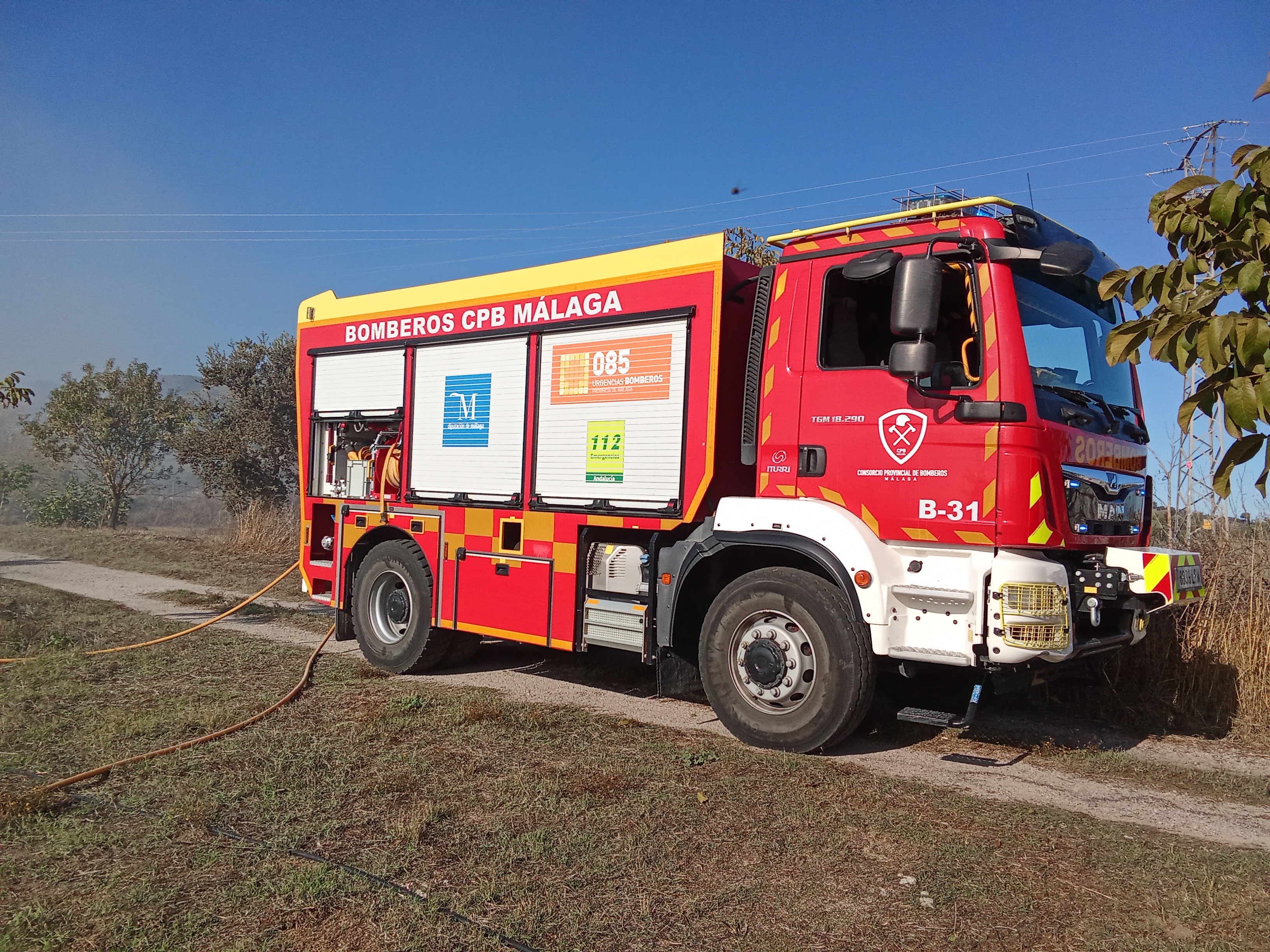 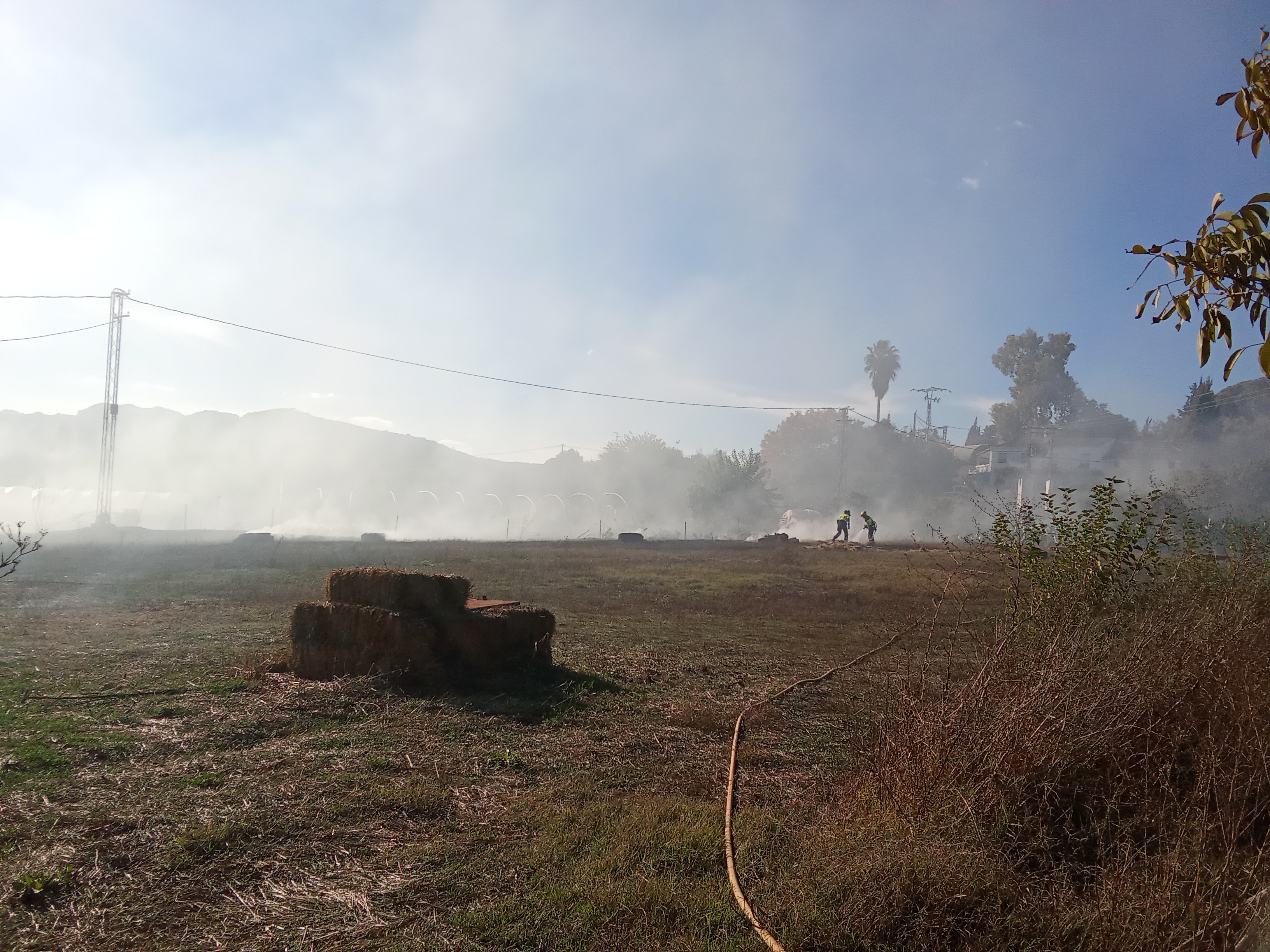 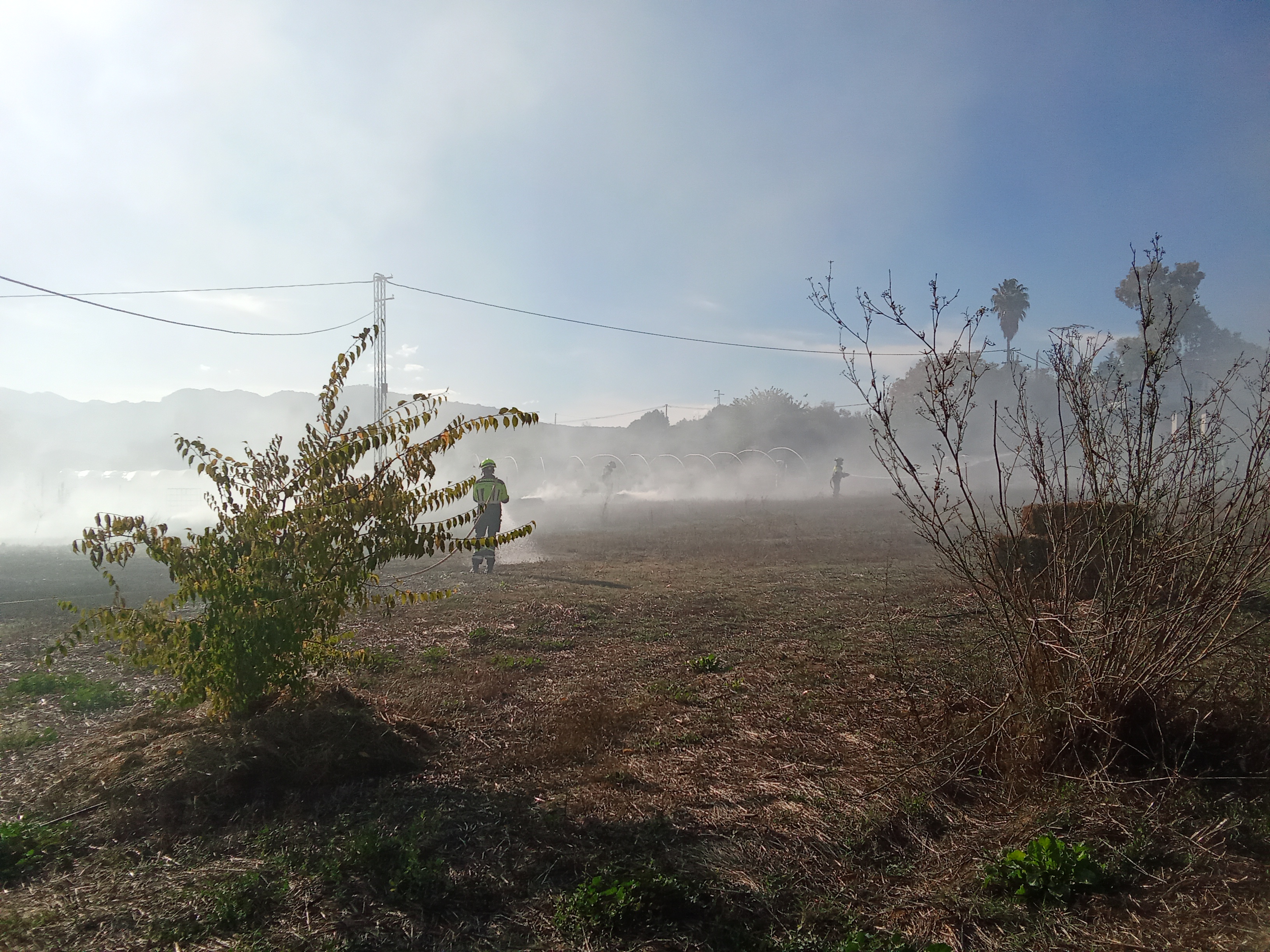
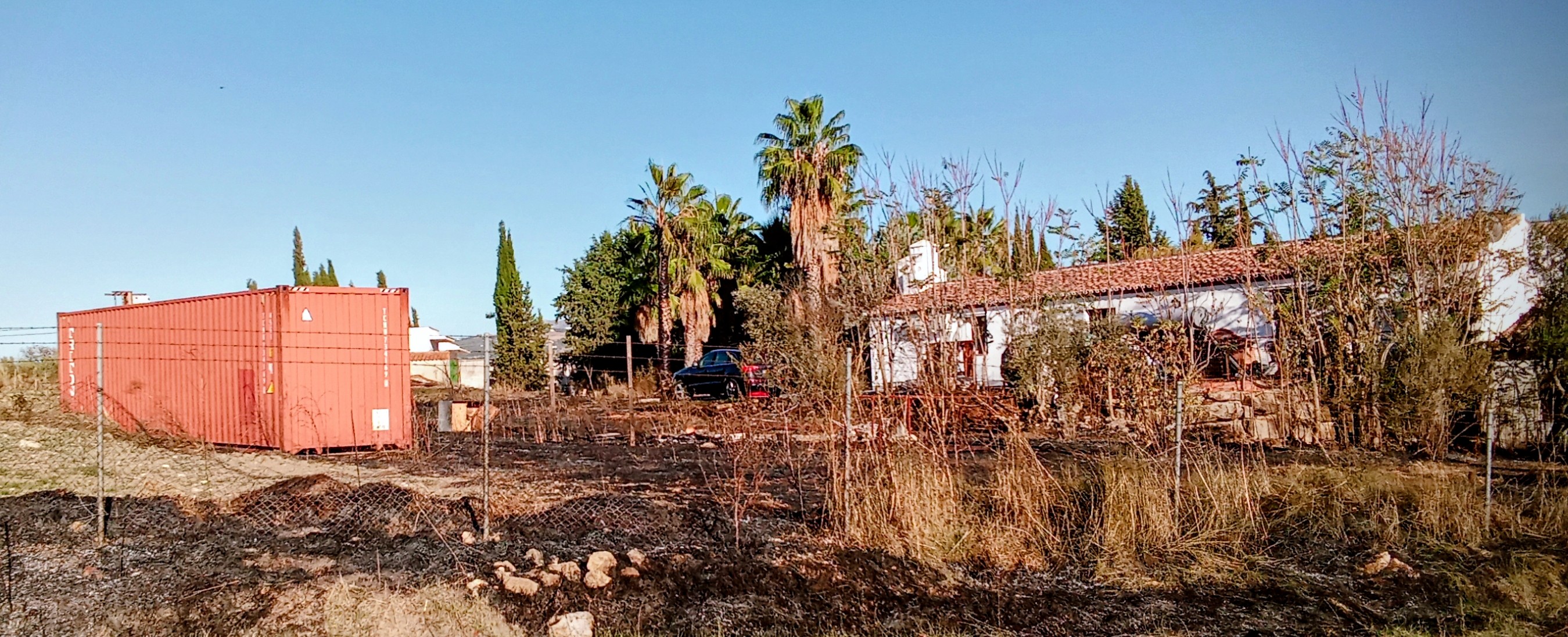 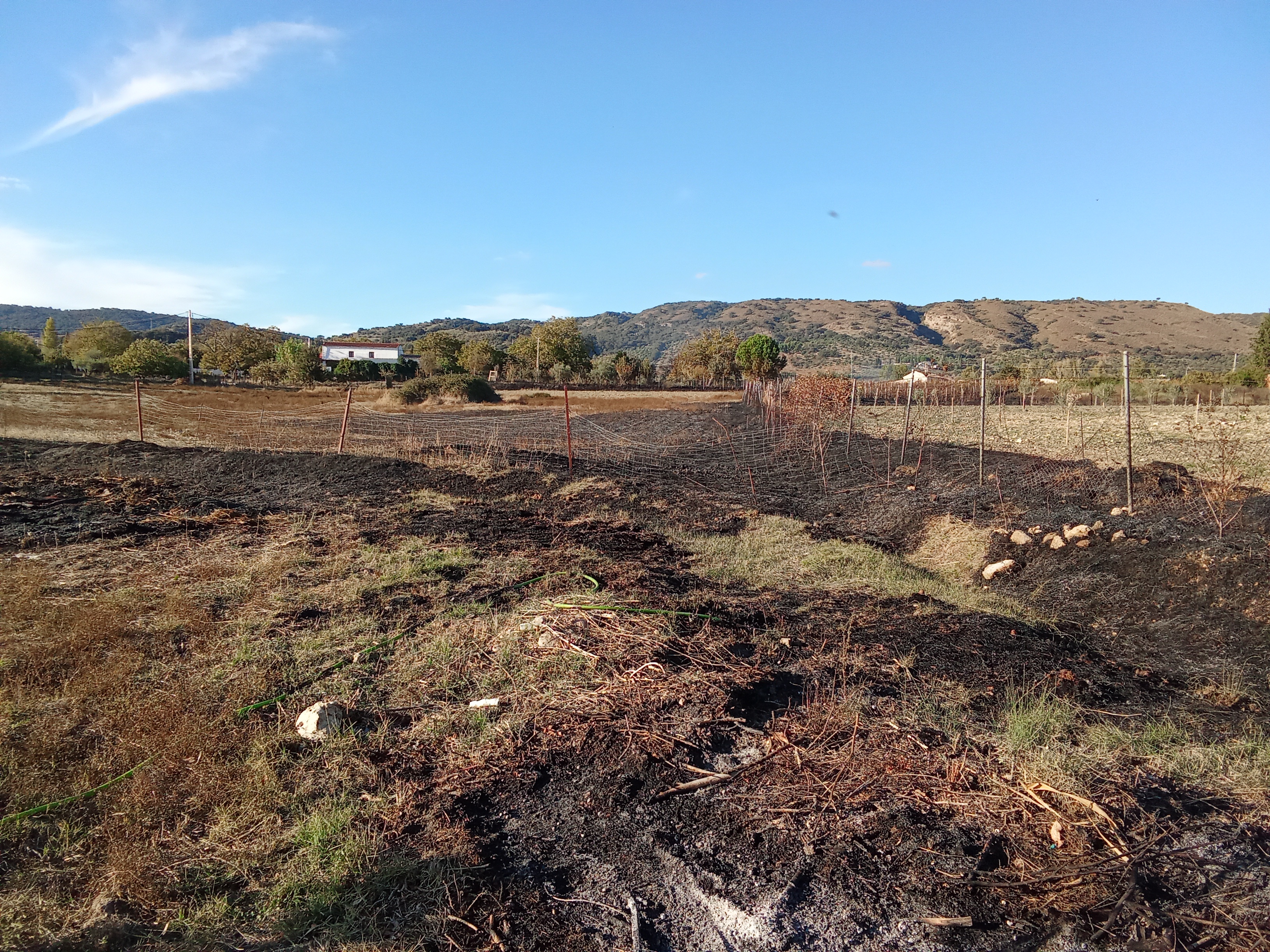
[Above photos by Paul Whitelock]
Dinner time
We had all pre-selected our three courses. I started with gambas (prawns) in filo pastry, followed by filetes de lubina and ending with Apfelstrudel. The wine was included, but I drank very little (too busy talking!).
 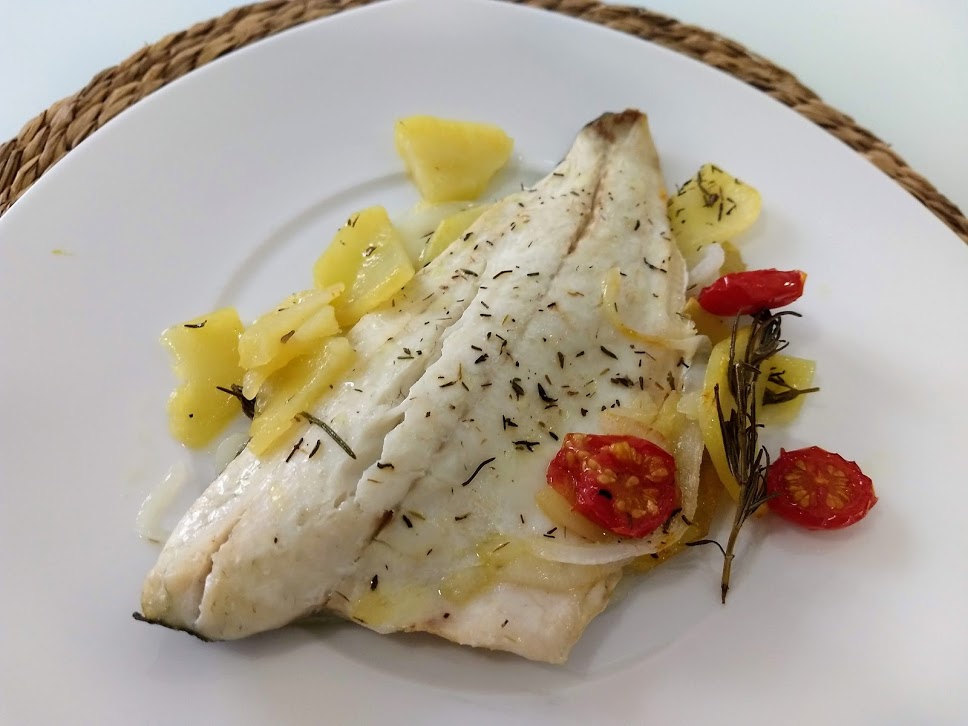 
gambas en filo [eurodrop] filetes de lubina [commememucho] Apfelstrudel [eurodrop]
The 21 members and guests enjoyed the evening: the presentation; the food; and the chit-chat over dinner.
 Sadly, it was all over by 10.00 pm, so we headed off home. Sadly, it was all over by 10.00 pm, so we headed off home.
Or, in my case, to my hotel in Fuengirola, the delightful three-star Hotel Agur, where I had a double room with balcony, private bathroom, TV and free WiFi for a mere 45,54€.
The secure car park cost 15€ for 24 hours.
Hotel Agur [Photo: Trivago]
Footnote:
I try to do these Press nights in as eco-friendly a manner as possible, by taking public transport (bus and train), finding cheap accommodation and walking a lot.
 On this occasion, the bus and train would not have worked to get to Fuengirola. On this occasion, the bus and train would not have worked to get to Fuengirola.
Yet my room was more economical than my last "cheap hotel" in Málaga, and much better, in every respect.
The most costly item that day, relatively speaking, was my nightcap, a half litre of Paulaner Hefeweizen (wheat beer), which cost an eye-watering 6.50€.
My room at the Hotel Agur [Paul Whitelock]
The next morning I opted for the hotel's buffet breakfast at 9.50€. An absolute "snip" for the choice and for the amount I managed to consume! I needed no lunch!
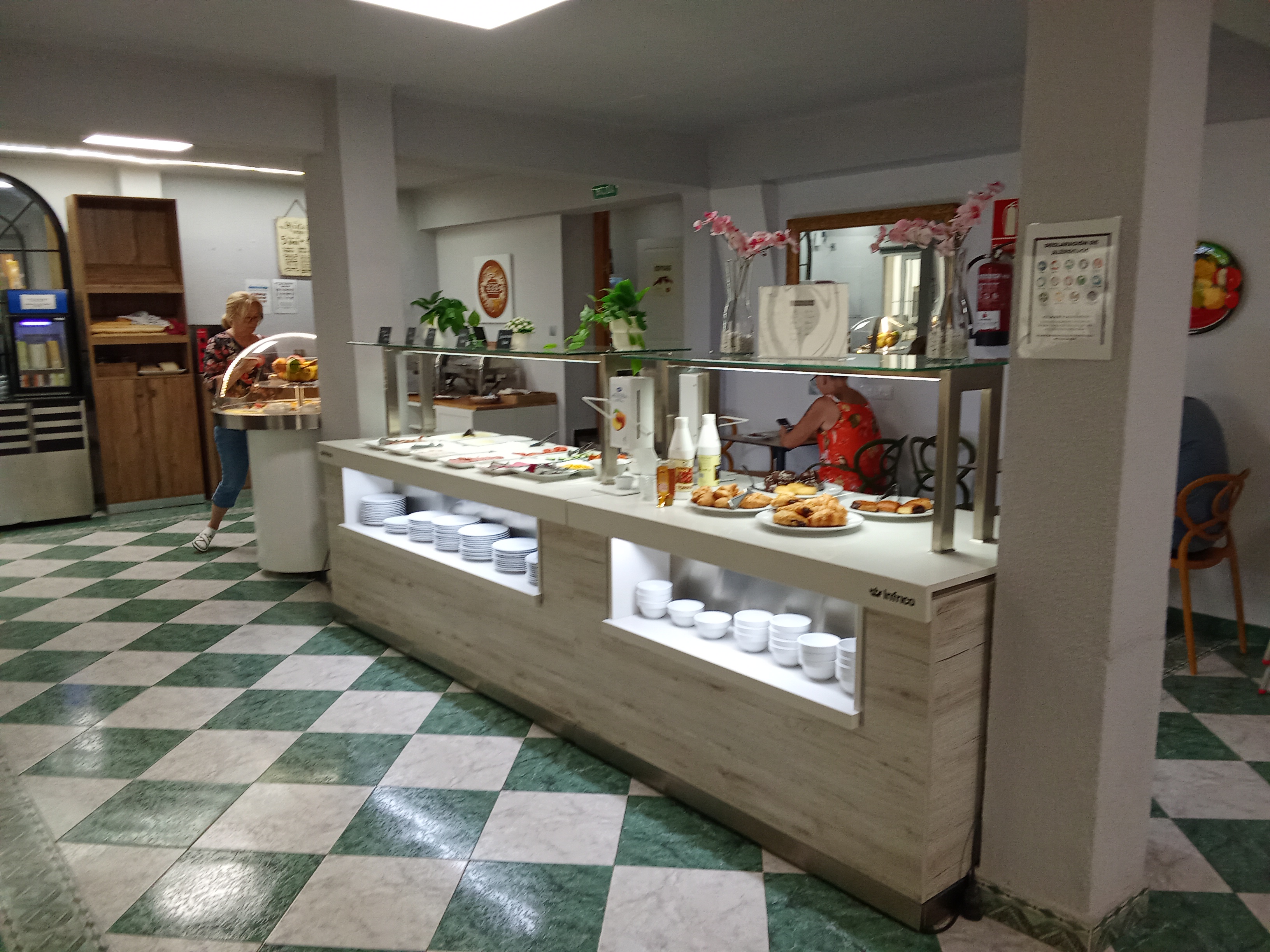
The splendid breakfast buffet at Hotel Agur in Fuengirola
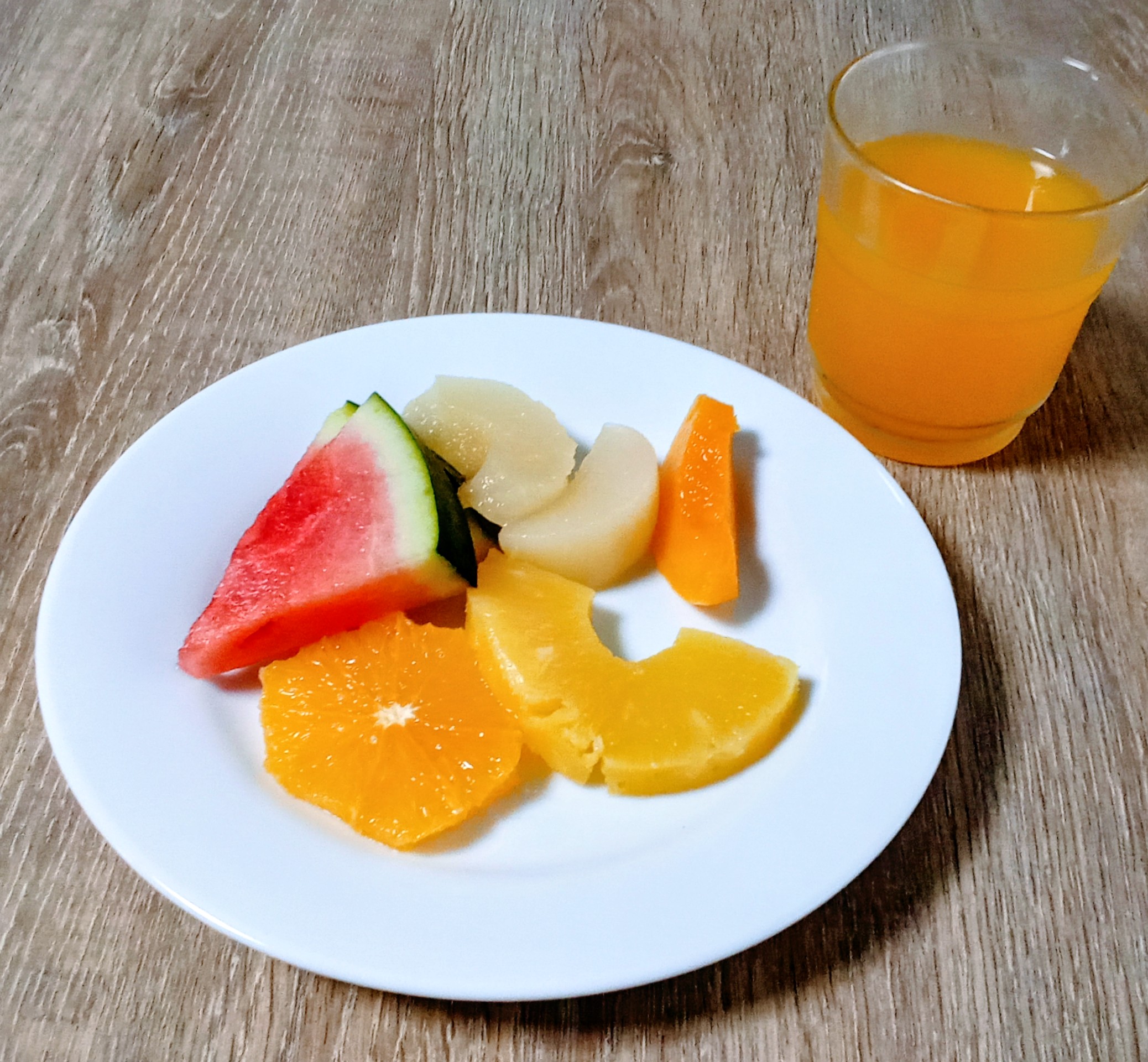  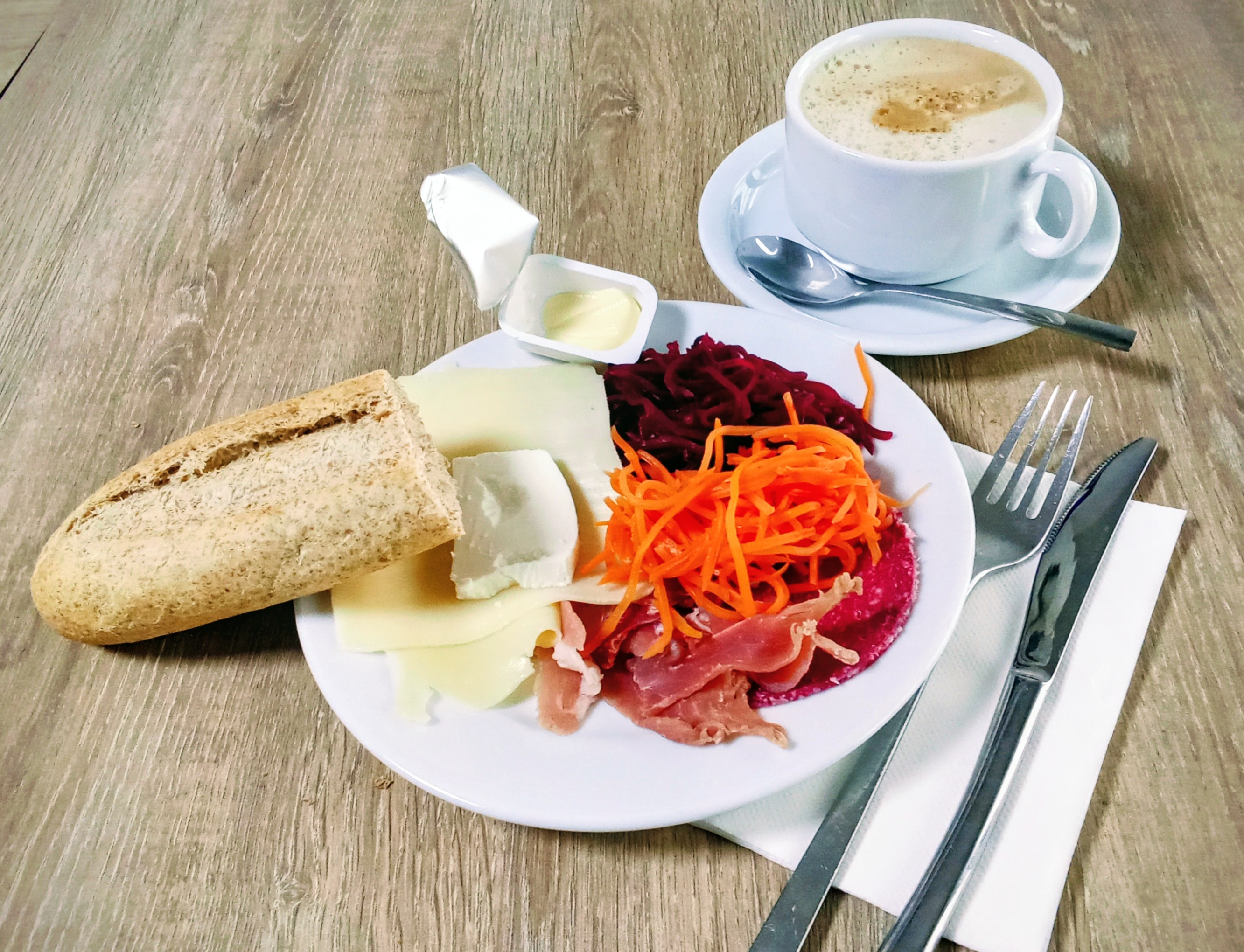 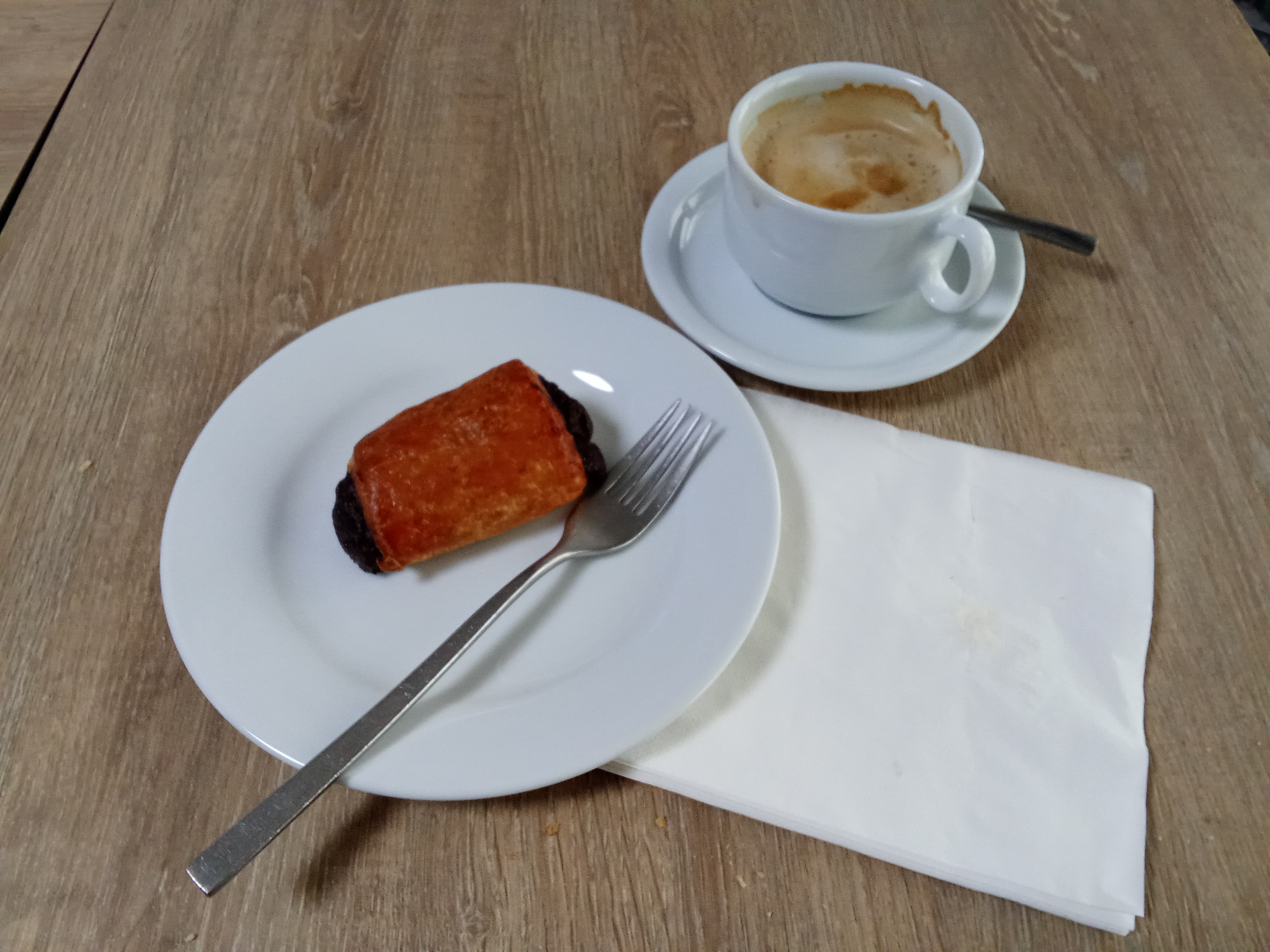
Fruit and juice to start Bacon, egg and baked beans Cheese, salchichon, shredded veg "pain au chocolat"
[All breakfast photos by Paul Whitelock]
Links:
BREAKING NEWS - DANA – Who or what is it?
Costa del Sol Foreign Journalists Association | Costa Press Club
fernando.comunica@gmail.com
uma.es
www.help-me-ronda.com
www.secretserrania.com
© Pablo de Ronda (Paul Whitelock)
Photos:
commememucho, EL PAIS, eurodrop, Karl Smallman, Paul Whitelock, The Guardian, Trivago
Thanks:
Fernando Fernández Alcaide, Karl Smallman, La Sierra restaurant, Neil Hesketh, Paul Whitelock
Tags:
Andalucia, apagon, ANEPPCE, Cerro de Aguila golf club, Chernobyl, Club de prensa de la Costa del Sol, commememucho, Costa Press Club, crisis management, dana, Digital Volunteers in Emergencies, ébola, EL PAIS, eurodrop, Fernando Fernandez Alcaide, Fuengirola, "Journalists as lifesavers", Karl Smallman, La Sierra restaurant, National Emergency Communication Committee of the National Association of Professional Specialists in Emergencies and Civil Proteccion, Neil Hesketh, Paul Whitelock, The Guardian, train crash in Galicia in 2003, Trivago, Universidad de Malaga, Valencia, VOST
áéíóú
 1
Like
Published at 12:28 PM Comments (0)
1
Like
Published at 12:28 PM Comments (0)
Boycott US Products!
Friday, October 31, 2025
 In protest at the catastrophic and highly damaging "regime" of President Donald J. Trump, the "Orange One", in the United States of America, I, like many others, have decided to boycott products from the USA. In protest at the catastrophic and highly damaging "regime" of President Donald J. Trump, the "Orange One", in the United States of America, I, like many others, have decided to boycott products from the USA.
I also have no wish ever to go there again. They probably wouldn't let me in anyway, after what I've written about the racist, sexist, convicted criminal who is inexplicably in charge of the world's most powerful country.
[Image courtesy of Red Bubble]
My Backstory
I have been to the States once, back in 1998, when my young family and I - wife Jeryl, and children Amy (15) and Tom (12) - spent a month, taking in New Orleans, Los Angeles, Malibu, Stanford University, San Francisco, Yreka, Tacoma and Seattle.
  
New Orleans [expedia.es] San Francisco [Lufthansa] Seattle [Conde Nast Traveler]
We were hosted throughout by family and friends, which meant we had a more meaningful experience - at least, we thought so.
 Yet even back then, nearly three decades ago, there were things I didn't like: the blatant racism against Native Americans (Red Indians), African Americans (blacks) and Mexicans ('Spics); the less obvious negative attitude towards Poles (Polacks), the Irish (Micks or Paddys) and Italians (Eyeties or Dagos); the dreadful food; the ridiculous licensing laws; compulsory tipping and poor quality hotels, infested with cockroaches and rats. Yet even back then, nearly three decades ago, there were things I didn't like: the blatant racism against Native Americans (Red Indians), African Americans (blacks) and Mexicans ('Spics); the less obvious negative attitude towards Poles (Polacks), the Irish (Micks or Paddys) and Italians (Eyeties or Dagos); the dreadful food; the ridiculous licensing laws; compulsory tipping and poor quality hotels, infested with cockroaches and rats.
[Photo: Amnesty International USA]
And it was all very expensive, even back then.
The current state of affairs
 Nowadays, following two disastrous Trump administrations, Joe Biden in between, and before them, Bill Clinton, George W. Bush and Barak Obama, whose legacies are not as good as they might have been, the USA has become a lawless land reminiscent of The Wild West. Nowadays, following two disastrous Trump administrations, Joe Biden in between, and before them, Bill Clinton, George W. Bush and Barak Obama, whose legacies are not as good as they might have been, the USA has become a lawless land reminiscent of The Wild West.
School shootings have increased beyond all proportion and forest fires - mostly arson - have laid waste, land, properties and left many dead.
[Photo courtesy of Rolling Stone]
My Boycott
 So back to the purpose of this article - my boycott of all things American. So back to the purpose of this article - my boycott of all things American.
I no longer buy American clothes, preferring clobber made by slaves in the Far East, rather than American slaves! Asian garments are readily available in Europe at a good price.
[Image: Hula Global]
I do not use American-owned airlines and I have never owned an American car. And, "sure as eggs", I won't be buying a TESLA anytime soon!
American Food
Nothing American gets into my shopping trolley.
 I have stopped buying Heinz Baked Beans, although the ones we get in Europe are produced in Wigan (UK), Paris (France) or La Rioja (Spain). I have stopped buying Heinz Baked Beans, although the ones we get in Europe are produced in Wigan (UK), Paris (France) or La Rioja (Spain).
There are plenty of alternatives whose origins are in France, Ireland, Spain and the UK. And they are invariably cheaper than H J Heinz.
HP Sauce is also owned by Heinz, but it is produced in Italy and Spain. So, that's ok, I think.
[Amazon]
Beer and Wine
US beer is virtually undrinkable, so I never buy Budweiser nor Coors. is virtually undrinkable, so I never buy Budweiser nor Coors.
Budvar, from the Czech Republic, is a different matter. It's a fine beer.
Beers on sale in the USA [PUNCH]
 American wines, eg from California, are delicious, but there are wines available elsewhere which are just as good. American wines, eg from California, are delicious, but there are wines available elsewhere which are just as good.
I'm talking about Austria, France, Germany, Italy, Luxembourg and Spain, as well as countries like Croatia, Greece, Hungary and Turkey.
Wine from Alsace, France [Grape Escapes]
A Confession
 I recently switched my internet provider to a company called Starlink and signed up for a one-year deal. I recently switched my internet provider to a company called Starlink and signed up for a one-year deal.
I subsequently learned that Starlink is owned by the ghastly Elon Musk, he of TESLA fame!
However, Musk is South African, isn't he? So, that's OK, or, is it ..... ?
Elon Musk's infamous Nazi salute [Photo: The Guardian]
Links:
© Pablo de Ronda (Paul Whitelock)
Images:
Amazon, Amnesty International USA, Conde Nast Traveler, El periodico, expedia.es, Grape Escapes, Hula Global, Lufthansa, PUNCH, Rolling Stone, The Guardian, Wikipedia
Thanks:
Google Images, Wikipedia, www.help-me-ronda.com
Tags:
Alsace, Amazon, American car, Amnesty International USA, baked beans, Conde Nast Traveler, Elon Musk, El Periodico, expedia.es, Grape Escapes, Heinz, Hula Global, Los Angeles, Lufthansa, Malibu, New Orleans, Pablo de Ronda, Paul Whitelock, PUNCH, Rolling Stone, San Francisco, Seattle, Stanford University, Starlink, Tacoma, The Guardian, Trump, Wikipedia, Yreka
 0
Like
Published at 4:21 PM Comments (0)
0
Like
Published at 4:21 PM Comments (0)
What a surprise!
Thursday, October 16, 2025
 When Charlie Mullins became a regular columnist for The Olive Press newspaper, I thought: When Charlie Mullins became a regular columnist for The Olive Press newspaper, I thought:
"Omigod! Jon Clarke (editor of said free paper published in Southern Spain) has hired a 'Leapy Lee', the racist, sexist, failed pop-star pr**k who writes for the EuroWeekly News (another free paper here on the coast)".
Charlie Mullins, OBE [Photo: Elite Business Magazine]
The story
Mullins' debut column didn't augur well for the future, I have to say.
However, since then this self-made millionaire who has decided to make his home in Estepona, Spain, has grown on me.
His recent column (Vol. 19, Issue 478) tackles the issue of immigration.
"You don't have to scroll far these days to find someone sounding off about immigration - whether it's in the UK or right here in Spain."
Writing about the many "Brits" who have made Spain their home, he opines that the "Spanish people have been incredibly welcoming" towards him.
[Photo: Issuu]
He contends that this is because he has always shown respect for their country, their way of life, and their culture.
He writes: "This isn't about Spain v. the UK, or locals v. expats. It's about decent people who make an effort, versus those who turn up with a sense of entitlement and no interest in fitting in".
As he writes, they are loud, brash, no manners, no clue. I agree.
A typical 'guiri' [Photo: Facebook]
Mullins claims he has never pretended to be Spanish. He lives in Spain, and is a "guest", which brings responsibilities. I agree absolutely. We will always be "guests".
 He refers to the British "expat" lady who left the UK because there were "too many foreigners", and moved to live in Spain. He refers to the British "expat" lady who left the UK because there were "too many foreigners", and moved to live in Spain.
She is now exactly that, a foreigner. In Spain. She has made no attempt to integrate.
"Guiris" [Daily Express]
Mullins is quite accepting of her - I am most definitely not! She is a hypocrite big-style!
In conclusion, Mullins writes: "This isn't about being anti-immigrant, it's about being anti-ignorant".
You have "hit the nail on the head", my friend.
Well done!
And well done to The Olive Press for hiring an excellent columnist, Charlie Mullins, OBE!
© Pablo de Ronda (Paul Whitelock)
Pictures:
Daily Express, Elite Business Magazine, Facebook, Issuu
Thanks:
Paul Whitelock, The Olive Press, Wikipedia
Tags:
Charlie Mullins, Daily Express, Elite Business Magazine, Estepona, EuroWeekly News, Facebook, guiri, Issuu, Jon Clarke, Leapy Lee, Pablo de Ronda, Paul Whitelock, The Olive Press, Wikipedia, www.help-me-ronda.com
 0
Like
Published at 9:50 PM Comments (0)
0
Like
Published at 9:50 PM Comments (0)
Spam post or Abuse? Please let us know
|
|